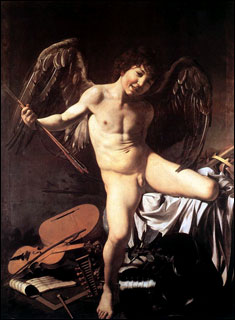|
|
|
|
 | Earl of Rochester |

Caravaggio. Amor Victorious, 1602-3.
T H E
Ninth E L E G Y
I N T H E
Second Book of Ovid's Amours,
T R A N S L A T E D.
To L O V E.
O Love! how cold and slow to take my Part?
Thou idle Wanderer about my Heart:
Why, thy old faithful Soldier wilt thou see
Oppress'd in thy own Tents? They murther me.
Thy Flames consume, thy Arrows pierce thy Friends;
Rather on Foes pursue more Noble Ends.
Achilles' Sword would certainly bestow
A Cure, as certain as it gave the Blow.
Hunters, who follow flying Game, give o'er
When the Prey's caught, Hopes still lead on before.
We thine own Slaves feel thy Tyrannick Blows,
Whilst thy tame Hand's unmov'd against thy Foes.
On Men disarm'd, how can you gallant prove ?
And I was long ago disarm'd by Love.
Millions of dull Men live, and scornful Maids:
We'll own Love valiant when he these invades.
Rome from each Corner of the wide World snatch'd
A Laurel, or't had been to this Day thatch'd.
But the old Soldier has his resting Place;
And the good batter'd Horse is turn'd to Grass:
The harass'd Whore, who liv'd a Wretch to please,
Has leave to be a Bawd, and take her Ease.
For me then, who have truly spent my Blood
(Love) in thy Service; and so boldly stood
In Caelia's Trenches; were't not wisely done,
E'en to retire, and live in Peace at home?
No—might I gain a Godhead to disclaim
My glorious Title to my endless Flame;
Divinity with Scorn I would forswear:
Such sweet, dear, tempting Devils Women are.
Whene'er those Flames grow faint, I quickly find
A fierce, black Storm pour down upon my Mind:
Headlong I'm hurl'd, like Horsemen, who, in vain,
Their Fury-flaming Coursers would restrain.
As Ships, just when the Harbour they attain,
Are snatch'd by sudden Blasts to Sea again:
So Love's fantastick Storms reduce my Heart
Half rescu'd, and the God resumes his Dart.
Strike here, this undefended Bosom wound,
And for so brave a Conquest be renown'd.
Shafts fly so fast to me from ev'ry Part,
You'll scarce discern the Quiver from my Heart.
What Wretch can bear a live-long Night's dull Rest,
Or think himself in lazy Slumbers blest?
Fool—is not Sleep the Image of pale Death?
There's time for Rest, when Fate hath stopt your Breath.
Me may my soft deluding Dear deceive;
I'm happy in my Hopes while I believe.
Now let her Flatter, then as fondly Chide:
Often may I enjoy; oft be deny'd.
With doubtful Steps the God of War does move
By thy Example, in ambiguous Love.
Blown to and fro like Down from thy own Wing;
Who knows when Joy or Anguish thou wilt bring,
Yet at thy Mother's and thy Slaves Request,
Fix an Eternal Empire in my Breast:
And let th' inconstant, charming Sex,
Whose wilful Scorn does Lovers vex,
Submit their Hearts before thy Throne:
The Vassal World is then thy own.
|
Rochester, John Wilmot, Earl of. The Works of John Earl of Rochester.
London: Jacob Tonson, 1714. 73-77.
Site copyright ©1996-2012 Anniina Jokinen. All Rights Reserved.
Page created by Anniina Jokinen on September 21, 2012.
|
|
|